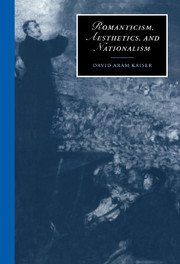Book contents
- Frontmatter
- Contents
- Acknowledgements
- List of abbreviations
- Introduction
- 1 Modernity, subjectivity, liberalism, and nationalism
- 2 The symbol and the aesthetic sphere
- 3 Schiller's aesthetic state
- 4 Symbol, state, and Clerisy: the aesthetic politics of Coleridge
- 5 The best self and the private self: Matthew Arnold on culture and the state
- 6 Aesthetic kingship and queenship: Ruskin on the state and the home
- 7 The aesthetic and political spheres in contemporary theory: Adorno and Habermas
- Notes
- Index
- Frontmatter
- Contents
- Acknowledgements
- List of abbreviations
- Introduction
- 1 Modernity, subjectivity, liberalism, and nationalism
- 2 The symbol and the aesthetic sphere
- 3 Schiller's aesthetic state
- 4 Symbol, state, and Clerisy: the aesthetic politics of Coleridge
- 5 The best self and the private self: Matthew Arnold on culture and the state
- 6 Aesthetic kingship and queenship: Ruskin on the state and the home
- 7 The aesthetic and political spheres in contemporary theory: Adorno and Habermas
- Notes
- Index
Summary
THE PROBLEM OF AESTHETIC INDETERMINACY
In contemporary literary theory, the indeterminate quality of literary language is often connected to progressive political principles, while determinate language is connected to totalizing political ideology. It is on this basis, for example, that Jerome McGann values Coleridge's writings over Hegel's:
Coleridge's theory of Romanticism is the archetypical Romantic theory – brilliant, argumentative, ceaseless, exploratory, incomplete, and not always very clear. Hegel's theory, speculative and total, represents the transformation of Romanticism into acculturated forms, into state ideology. Hegel sentimentalizes Romanticism by domesticating its essential tensions, conflicts, and patterns of internal contradiction.
In this model of literary history, literary indeterminacy both originates in Romanticism and is its archetypal achievement. Because Romanticism has given us indeterminacy, the argument goes, it has also given us the tools of progressive political thought, or, at least, has given us the tools to resist totalizing systems of discourse.
Of the many works of Romanticism associated with the concept of indeterminacy, Schiller's theory of aesthetic play in the Aesthetic Letters in particular has been viewed as a model of how indeterminacy acts as a force for progressive political development.
- Type
- Chapter
- Information
- Romanticism, Aesthetics, and Nationalism , pp. 1 - 10Publisher: Cambridge University PressPrint publication year: 1999



